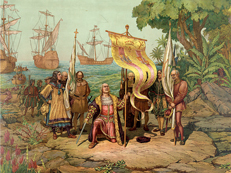Though I have never formally learnt about Christopher Columbus in school, in my mind he had always been portrayed as heroic – possibly I assumed this because of the countries and provinces which are named after him, possibly also because of the fact that he must have been an intelligent individual and highly skilled navigator. Since moving to Canada and learning about American history I am aware of the devastating impact of cultural myopia and colonialism, though I still never held Columbus personally accountable. Reading Columbus’s personal memoir was very strange for me; I found it shocking how brief some of his daily accounts were. Many people who experience historical events of huge difficulty and significance seem to have written detailed thoughtful accounts of their life and plans, for example Anne Frank, Adolf Hitler and Nelson Mandela, whereas this text struck me as more of a report – the prologue implies it was presumably a report to the monarchy of Spain. I had assumed that he wrote to process his thoughts and emotions, but it seems this is not the case. It makes me question – did Columbus have so much faith that he would eventually make it back to Spain to hand over the account? Did he leave instructions for what was to happen to it after his death, or make more than one copy?
Despite the structural style, Columbus described many of his surroundings and experiences in a lyrical, poetic way – as mentioned in the lecture this week. Hauntingly, I found a certain purity in his words – despite the insensitive language sometimes used to describe people he encounters, he is undoubtedly in awe of what he finds, “no man could look at [the fish] without amazement and delight, the colours are so beautiful”. The villain character he is so often made out to be does not line up with the naivety of his words when discovering this new land – and from his perspective just doing his job. He wrote, “They captured [the Native American] but told him they meant him no harm”.
The other assigned reading shows a similar history from a vastly different perspective. I found it uncomfortable to read, though it is more like what I was expecting when learning about colonialism in a class on Latin American studies. It is difficult to consider this piece alongside Columbus’s account. After mentioning how the Inca believed the newcomer to be a “lord in his kingdom” one phrase which stuck out to me was “…the soldiers began to kill Indians like ants”. This notion is supported by the assigned student video “The Meeting of the Two Worlds II” – which discusses the horrific abuse of the native people, and also the after effects of their invasion; 90% of Native Americans were killed from contact with Europeans – largely through disease. I’d like to learn more about how far there was miscommunication between the indigenous people and the explorers, and how far, perhaps, Columbus’s account is untruthful or unreliable?

